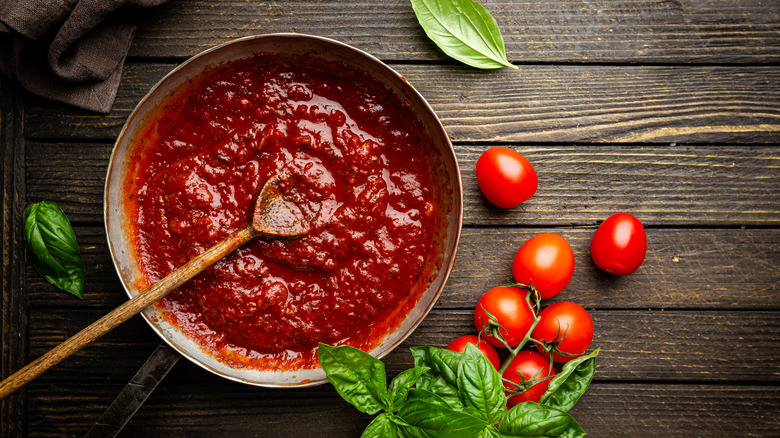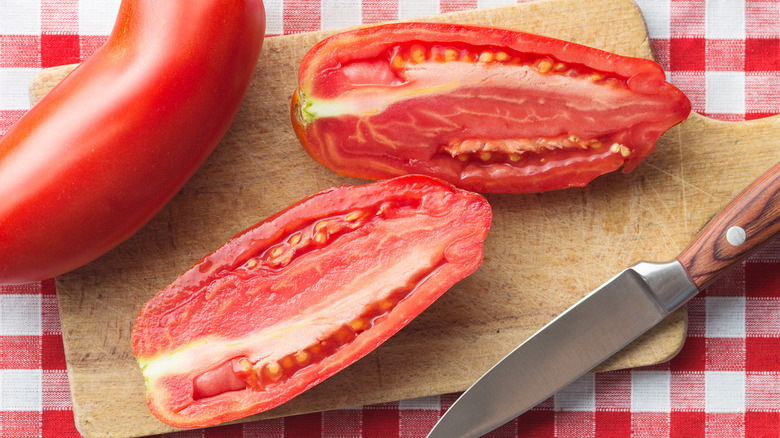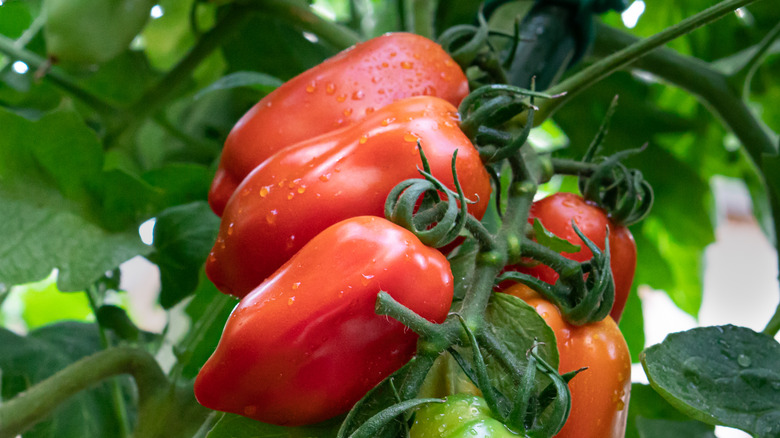What To Consider When Choosing Fresh Tomatoes For Homemade Sauce
Homemade tomato sauce is one of the greatest things to teach yourself to make. The process is simple, and the results are often far tastier than anything you can buy at the grocery store. A great way to start is by using any number of excellent canned tomatoes in order to get a feel for the consistency and flavor that you like. Soon enough, though, that sunny patch of lawn is going to start speaking to you.
But there are a few steps to take before you start your seeds and make a down payment on that gleaming rototiller. Primary among them is what variety of tomato you are going to plant. It may come as a surprise, but not all tomatoes are great for making sauce. Some tomatoes are better in salads or atop burgers. Some have more intense flavors that may not necessarily be what you're going for. Therefore, it's important to do some research before you get any seeds in the ground.
Grocery stores or farmer's markets are a great help, as there are multiple varieties of tomatoes available to you. Grab a handful of different types and slice them in half to examine. The first thing you will notice is that a Roma and a Beefsteak, to take just two, are almost nothing alike. The number of seeds, amount of water, and thickness of the flesh can vary widely from tomato to tomato, and each is important in choosing the right tomato for sauce.
Seeds, water, and flesh
There is as much diversity in color, shape, size, texture, and taste for tomatoes as there is with any other plant species, and the categories that count for sauce tomatoes are seed count, water content, and flesh. Seed count should be on the lower side for a good sauce tomato. Seeds do not cook down and can easily affect the texture of your sauce. Does anyone really want to be picking hundreds of tomato seeds out of their teeth? No, they don't.
Another thing to be cautious of is water content. While it's true you need water to make tomato sauce, you don't want too much. Tomatoes with higher water content and thin flesh make for a characteristically thin, watered-down sauce. The best tomato sauces are those that are reasonably thick and cling well to whatever food you use them with. Watery sauce, conversely, will collect at the bottom of your plate and have an uninteresting flavor.
Finally, you want to be sure that the tomatoes have a thick flesh. As a tomato stews, the flesh will cook down, releasing the tomatoey essence into the sauce and thickening it at the same time. Thicker-skinned, dense tomatoes with the right amount of pulp are the ones that are going to give you that signature saucy consistency you are looking for.
The best sauce tomatoes
No tomato meets the criteria above better than the San Marzano. Many chefs and gardeners tout these plump Italian heirlooms as being the all-time greatest sauce tomato. Long and shaped like fat red teardrops, San Marzano tomatoes have firm, pulpy flesh, low water content, and low seed count. The dense flesh makes for a naturally hearty sauce, which obviates the need for thickening agents. San Marzano's are easy to care for when gardening, so long as they're allowed the sunniest spot in the yard.
You'd be hard-pressed to find any Italian cultivar unsuitable for making sauce. Others like the Roma, which are excellent for making tomato paste, the Costoluto Genovese, which are great slicing tomatoes, and the Giulietta, which do well in greenhouses, are all excellent varieties for sauce. An American variety to look out for is the Amish Paste. Similar in shape to Roma and San Marzano, Amish Paste tomatoes, as the name suggests, are exceptionally fleshy and produce a thick sauce; they're also fantastic for rendering into tomato paste.
These are just a few examples of the types of tomatoes that meet the sauce-making criteria. Larger, watery tomatoes like a beefsteak, while excellent on sandwiches, will yield a dull, watery sauce. If you're buying from seed, the packet will tell you the qualities of the tomato and indicate if it's good for sauce. And once that harvest ripens, your summer weekends will be dedicated to sauce-making.


